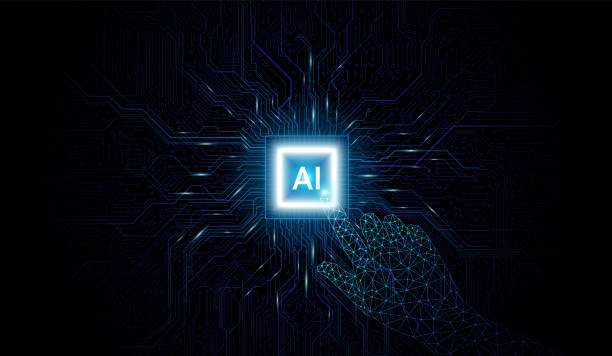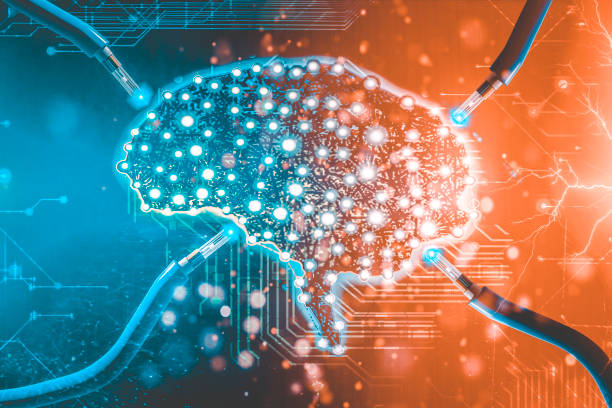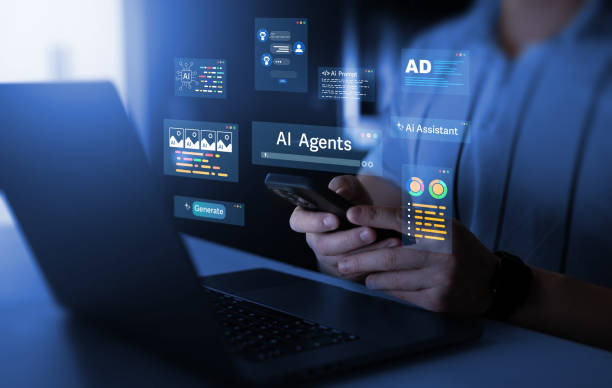What is Artificial Intelligence: Key Definitions and Concepts

#Artificial_Intelligence (AI) is a branch of computer science that seeks to build machines capable of performing tasks currently performed by humans.
This general definition encompasses a wide range of abilities, from simple pattern recognition to complex decision-making.
Artificial Intelligence is not a single concept, but rather a collection of different techniques and approaches that pursue a common goal.
In essence, AI attempts to simulate human thought and reasoning processes in machines.
To better understand this topic, AI can be divided into several categories:
- Weak AI (also known as Narrow AI) is designed to perform a specific task.
Examples include voice assistants like Google Assistant and Siri, movie recommendation systems on Netflix, and facial recognition software. - Strong AI (also known as General AI) possesses the ability to understand, learn, and apply knowledge across a wide range of tasks, just like a human.
This type of AI is still in the research stages and does not currently exist.
Meanwhile, Machine Learning is a crucial subfield of AI that allows machines to learn from data without explicit programming.
Deep Learning is also an advanced machine learning technique that uses artificial neural networks with many layers.
This technique has made significant strides in recent years and has been applied in many areas such as computer vision and natural language processing.
Does your current website build the trust that potential customers should have in your business? If the answer is no, it’s time to get your professional and impactful corporate website with Rasav.
✅ Fully custom design tailored to your brand identity
✅ Increased lead generation and business credibility in the eyes of customers⚡ Contact us for a free consultation!
Types of Machine Learning Algorithms and Their Applications

Machine learning is the beating heart of many AI systems.
This approach allows machines to identify patterns by analyzing data and improve their performance without the need for explicit programming.
Machine learning algorithms come in various types, each suitable for a specific kind of problem.
Generally, machine learning algorithms can be divided into three main categories:
- Supervised Learning In this method, the algorithm is trained using labeled data.
Labeled data includes expected input and output.
The goal of the algorithm is to learn a function that can map input to the correct output.
Examples of this method include linear regression, logistic regression, Support Vector Machines (SVM), and neural networks. - Unsupervised Learning In this method, the algorithm is trained using unlabeled data.
The goal of the algorithm is to discover patterns and structures in the data.
Examples of this method include Clustering and Dimensionality Reduction. - Reinforcement Learning In this method, the algorithm learns how to make decisions that maximize reward by interacting with an environment.
This method is commonly used in games and robotics.
Choosing the right algorithm depends on the type of problem, the volume of data, and the evaluation criteria.
For instance, if the goal is to predict housing prices, linear regression or neural networks can be used.
But if the goal is to group customers based on their purchasing behavior, clustering can be used.
Natural Language Processing (NLP) and its Role in Human-Machine Interaction

Natural Language Processing (NLP) is a branch of artificial intelligence that enables machines to understand and process human language.
This field helps machines to comprehend the meaning of text and speech, answer questions, perform translations, and even generate text.
NLP plays a significant role in human-machine interaction and has wide-ranging applications in various fields.
Some important applications of NLP include:
- Voice assistants like Siri and Google Assistant, which can understand and respond to voice commands.
- Machine translation, which can translate texts from one language to another.
- Sentiment analysis, which can identify emotions and opinions in texts.
- Text summarization, which can condense long texts into short summaries.
- Chatbots, which can converse with users via text or voice.
NLP uses various techniques, including machine learning, deep learning, and linguistic rules.
NLP algorithms are constantly evolving, and machines are becoming better at understanding human language day by day.
| Application | Description |
|---|---|
| Voice Assistant | Understanding voice commands and responding to them |
| Machine Translation | Translating texts from one language to another |
| Sentiment Analysis | Identifying emotions and opinions in texts |
Computer Vision and Machines’ Ability to See

Computer Vision is a branch of artificial intelligence that enables machines to understand and interpret images and videos.
This field helps machines identify objects, people, and scenes, detect movements, and extract useful information from images.
Computer Vision has widespread applications in various fields, including autonomous vehicles, facial recognition, medical diagnosis, and robotics.
Some important applications of Computer Vision include:
- Autonomous vehicles that use computer vision to understand their surroundings and drive without human intervention.
- Facial recognition, which is used in security systems, social networks, and smartphones.
- Medical diagnosis, which helps doctors detect diseases in medical images.
- Robotics, which enables robots to understand their surroundings and interact with them.
Computer Vision uses various techniques, including machine learning, deep learning, and image processing.
Computer Vision algorithms are constantly evolving, and machines are becoming better at understanding images and videos day by day.
One of the significant challenges in Computer Vision is dealing with changes in lighting, viewing angle, and occlusion.
Computer Vision algorithms must be able to identify objects under various conditions.
Are you bothered by losing customers due to your e-commerce website’s outdated appearance or slow speed? Rasav’s expert team solves these problems with professional e-commerce website design!
✅ Increased customer trust and brand credibility
✅ Blazing fast speed and excellent user experience
Get a free consultation with Rasav now ⚡
Applications of Artificial Intelligence in Medicine and Healthcare

Artificial Intelligence (AI) is creating significant transformations in the field of medicine and healthcare.
From more accurate disease diagnosis to the development of new drugs and improved patient care, AI has great potential to enhance the quality and accessibility of healthcare services.
Some important applications of AI in medicine and healthcare include:
- Disease diagnosis using medical images such as radiology, MRI, and CT scans.
AI algorithms can identify subtle patterns in these images, helping doctors diagnose diseases more accurately and quickly. - New drug development using genomic and pharmaceutical data.
AI can help identify new drug targets and design molecules with better therapeutic effects. - Personalized treatment using patient data, medical history, and genetic information.
AI can assist doctors in choosing the best treatment method for each patient. - Surgical robots that can perform complex surgeries with greater precision and delicacy.
- Patient monitoring using wearable sensors and IoT devices.
AI can analyze data collected from these devices, helping doctors detect problems early and provide preventive care.
Of course, the use of AI in medicine and healthcare also presents challenges.
These challenges include protecting patient privacy, ensuring the accuracy and reliability of algorithms, and training physicians to use these technologies.
The Impact of Artificial Intelligence on Industry and Economy

Artificial Intelligence (AI) is rapidly reshaping global industry and economy.
By automating tasks, increasing productivity, reducing costs, and creating new opportunities, this technology has profound impacts on businesses and various industries.
AI has the potential to accelerate economic growth, create new jobs, and improve the quality of life.
Some important impacts of AI on industry and economy include:
- Automation, which leads to increased productivity and reduced costs.
AI can automate repetitive and tedious tasks, allowing employees to focus on more complex and creative duties. - Improved decision-making using advanced data and analytics.
AI can analyze vast amounts of data and identify patterns and trends that are not visible to humans.
This information can help managers make better and more informed decisions. - Creation of new products and services.
AI can help companies develop new and innovative products and services.
For example, autonomous vehicles, voice assistants, and movie recommendation systems have all been developed using AI. - Enhanced customer experience by providing personalized services and faster response times.
AI can help companies better understand customer needs and provide services tailored to them.
However, the use of AI in industry and economy also presents challenges.
These challenges include job displacement due to automation, the need for new skills, and ethical concerns related to the use of AI.
Ethical Challenges and Opportunities in AI Development

The development of Artificial Intelligence (AI) not only provides great opportunities for human progress but also brings significant ethical challenges.
With the expansion of AI applications in various fields, special attention must be paid to the ethical issues related to this technology.
Some important ethical challenges and opportunities in AI development include:
- Privacy through the collection and analysis of vast amounts of personal data.
AI can be used for tracking, surveillance, and manipulation of individuals. - Bias in AI algorithms, which can lead to unfair and discriminatory decisions.
- Accountability in case of errors or harm caused by AI systems.
- Transparency in the operation of AI algorithms, which can increase public trust.
- Impact on employment through task automation and job displacement.
To address these ethical challenges, it is necessary to:
- Formulate appropriate laws and regulations to govern the development and use of AI.
- Define ethical standards for the development and use of AI.
- Conduct public education and awareness campaigns regarding ethical issues related to AI.
| Challenge | Description |
|---|---|
| Privacy | Collection and analysis of personal data |
| Bias | Unfair and discriminatory decision-making |
| Accountability | Responsibility in case of error or harm |
The Future of Artificial Intelligence and Upcoming Prospects

The future of Artificial Intelligence (AI) is full of potential and possibilities.
With continuous advancements in this technology, AI is expected to play a more significant role in our daily lives and bring about profound transformations in various fields.
AI in the future will likely be capable of performing more complex tasks, making better decisions, and interacting more naturally with humans.
Some of the upcoming prospects in the field of Artificial Intelligence include:
- Artificial General Intelligence (AGI), which will be capable of performing any task a human can.
- Explainable AI (XAI), which will be capable of explaining how it makes its decisions.
- Automated Machine Learning (AutoML), which will be capable of automatically designing and training machine learning models.
- Edge AI, which will be capable of processing data at the edge of the network, close to the data source.
These advancements can lead to the creation of smarter systems capable of solving complex problems, providing personalized services, and improving the quality of life.
However, special attention must also be paid to the ethical challenges related to AI development to prevent the misuse of this technology.
Did you know that customers’ first impression of your company is your website? Multiply your business credibility with a powerful corporate website from Rasav!
✅ Custom and eye-catching design tailored to your brand
✅ Improved user experience and increased customer attraction
⚡ Get a free consultation!
Artificial Intelligence in Iran: Current Status and Development Potentials

Artificial Intelligence in Iran has also gained attention as an emerging technology, and efforts are being made to develop it in various fields.
Despite challenges such as budget shortages and a lack of skilled personnel, Iran has significant potential for AI development.
Some of the areas where AI is being developed in Iran include:
- Medicine and healthcare, using AI for disease diagnosis, drug development, and providing medical services.
- Agriculture, using AI to improve productivity, reduce costs, and manage resources.
- Transportation, using AI for developing autonomous vehicles, traffic management, and improving safety.
- Education, using AI for personalized learning, providing suitable educational content, and improving learning outcomes.
To develop AI in Iran, it is necessary to:
- Increase investment in AI research and development.
- Train more skilled personnel in the field of AI.
- Strengthen cooperation between universities, industry, and government.
- Formulate appropriate laws and regulations to govern the development and use of AI.
AI Learning Resources for Beginners

If you are interested in learning Artificial Intelligence, there are many resources available to get started.
These resources include online courses, books, articles, and practical projects.
Choosing the right resource depends on your prior knowledge and learning goals.
Some reputable resources for learning AI include:
- Online courses offered by reputable universities and educational institutions.
These courses usually include videos, exercises, and practical projects.
Websites like Coursera, Udemy, and edX offer a variety of courses in AI. - Books that comprehensively cover various AI topics.
Some famous books in this field include “Artificial Intelligence A Modern Approach” by Stuart Russell and Peter Norvig, and “Deep Learning” by Ian Goodfellow, Yoshua Bengio, and Aaron Courville. - Scientific articles that present new research findings in AI.
Websites like arXiv and Papers with Code publish many articles on AI. - Practical projects that allow you to apply your knowledge in practice.
Websites like Kaggle host various competitions and projects in AI.
By using these resources, you can acquire the necessary knowledge and skills to enter the world of Artificial Intelligence.
TensorFlow is one of the AI libraries.
Remember that learning AI is a continuous process that requires patience and perseverance.
Frequently Asked Questions
| Question | Answer |
|---|---|
| 1. What is Artificial Intelligence (AI)? | It is a branch of computer science that aims to create machines capable of simulating human intelligence and performing tasks that require human thought, such as learning, problem-solving, and decision-making. |
| 2. What are the main types of Artificial Intelligence? | It can be classified into Weak AI (Narrow AI) focusing on a specific task, General AI possessing comprehensive human capabilities, and Super AI surpassing human intelligence. |
| 3. Mention some common applications of Artificial Intelligence in our daily lives. | These include voice assistants (like Siri and Alexa), recommendation systems (like Netflix and Amazon), self-driving cars, facial recognition systems, and spam filters. |
| 4. What is the difference between Artificial Intelligence and Machine Learning? | Artificial Intelligence is the broader concept of creating intelligent machines, while Machine Learning is a subset of AI focusing on enabling systems to learn from data without explicit programming. |
| 5. What is Deep Learning? | It is a subset of Machine Learning that uses multi-layered artificial neural networks (deep neural networks) to process data and discover complex patterns, and is used in image and speech recognition. |
| 6. What are the main benefits of Artificial Intelligence? | Improving efficiency and productivity, automating repetitive tasks, making better decisions based on big data analysis, and developing solutions for complex problems in fields like medicine and science. |
| 7. What are the main challenges facing the development and deployment of Artificial Intelligence? | These include the need for vast amounts of high-quality data, privacy and security issues, bias in data and algorithms, and high development and maintenance costs. |
| 8. Does Artificial Intelligence raise ethical or social concerns? | Yes, it raises concerns related to privacy, algorithmic bias, job displacement due to automation, accountability for errors made by intelligent systems, and the need for a regulatory framework. |
| 9. How can Artificial Intelligence affect the future of the job market? | It can lead to the automation of some routine jobs, but it will also create new jobs requiring advanced skills in developing, operating, and maintaining AI systems. |
| 10. What are some modern or promising technologies in the field of Artificial Intelligence? | These include advanced Natural Language Processing (NLP) (such as large language models like ChatGPT), computer vision, robotics, and Generative AI. |
And other advertising services from Rasav Advertising Agency:
- Smart Digital Branding: A fast and efficient solution for increasing website traffic with a focus on intelligent data analysis.
- Smart Website Development: Designed for businesses seeking user engagement through custom programming.
- Smart Social Media: Revolutionize campaign management with the help of key page optimization.
- Smart Brand Identity: A professional solution for customer behavior analysis with a focus on precise audience targeting.
- Smart Social Media: A creative platform for improving customer behavior analysis with custom programming.
And over hundreds of other services in internet advertising, advertising consultation, and organizational solutions.
Internet Advertising | Advertising Strategy | Advertorials
Sources
What is Artificial Intelligence? A Comprehensive Guide and Applications
Article: What is Artificial Intelligence and How Does It Work?
Applications of Artificial Intelligence in Today’s World
Artificial Intelligence: 10 Important Applications in Business
? With Rasav Afarin, the future of your business in the digital world is guaranteed! With our expertise in providing comprehensive digital marketing solutions, including corporate website design and advanced SEO strategies, we will transform your online presence and accompany you on the path to sustainable growth and success.
📍 Tehran, Mirdamad Street, next to Bank Markazi, Kazeroun Jonoubi Alley, Ramin Alley, No. 6



